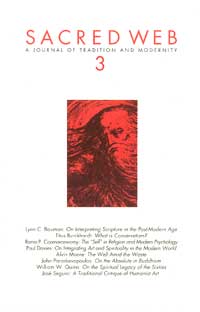Menu:
This article appeared in Sacred Web 3. This issue is SOLD OUT. To order other back issues of Sacred Web, click here.
Online Articles
Editorial
Pluralism and the Metaphysics of Morality
By M. Ali Lakhani
![]() We are spirits. That bodies should be lent us, while they can afford us pleasure,
We are spirits. That bodies should be lent us, while they can afford us pleasure,
assist us in acquiring knowledge, or doing good to our fellow creatures,
is a kind and benevolent act of God.![]()
Benjamin Franklin
How should a society organize itself? How can one properly resolve the tensions between equal rights and individual freedoms? At the root of both equality and freedom lies the question: What is morality? These are the fundamental questions underlying the pluralist discourse in modern societies. The motto on the Great Seal of the United States ("E Pluribus Unum") suggests a possible nexus between pluralism and its metaphysical origins. The philosophy of Dostoevsky's Ivan Karamazov ("If God is dead, then everything is permitted") suggests a similar nexus between morality and its spiritual foundations. Without this nexus, there can be only error.
There are two errors that must be guarded against in the pursuit of Truth or Reality. These are reductionism and relativism. Both errors derive from a denial of the traditional metaphysical principle that Reality, being Absolute, can be neither reduced to the conditions of existence (hence, reductionism) nor excluded from it (hence, relativism). A corollary of this principle is that Truth has a transcendent aspect (entailing Faith) as well as an immanent aspect (manifesting as the Spirit/Intellect). It is as dangerous, therefore, to isolate either of these aspects as it is to ignore them. The isolation of Faith (or the denial of the Intellect) is a reductionist tendency and can lead to a sclerotic dogmatism and the tyranny of "fundamentalism", while the isolation of the Intellect (or the denial of Faith) is a relativist tendency and can lead to an extreme subjectivism and anarchy. The corrective of dogmatism is deconstruction, and vice versa. Between these two lies the field of engagement, the narrow pathway between reductionism and relativism, the Straight Path of Tradition.
Equality and freedom are two of the pillars of modernity. They are also two of its grandest illusions. For neither equality nor freedom can truly exist extrinsically in reality. Intrinsically (and from the traditional perspective), they exist only as attributes of the spiritual dimension of reality: the Spirit is equal notwithstanding its pluralism, and is free notwithstanding its formal limitations. To understand equality and freedom otherwise is to commit the errors of reductionism (in the case of equality) or relativism (in the case of freedom). Outside of its spiritual dimension, equality tends to become a homogenizing force that reduces itself to the harmony of the lowest common denominator, whatever that may be, however devoid of spiritual value; while, freedom tends to become a permissive liberalism that manifests in the privatization of morality, however devoid of virtue.
Much of the pluralist discourse centers on the term "value". Equality and freedom are touted as fundamental "values", and many a modern society is founded on the "values" enshrined in a Bill of rights or Charter of Rights and Freedoms. Tradition focuses on "virtue" rather than on "value". To be virtuous automatically entails a limit on freedom, a limit that is sometimes expressed as conscience or responsibility. It incorporates the notion of a hierarchical society in which authority derives from virtue, in which diversity is embraced through the moral intelligence of love rather than atomized or homogenized by recourse to secular "values".
Tradition provides both the doctrine (theoria) and the method (praxis) for apprehending and conforming to Truth or Reality. From the perspective of Tradition, Truth is Presence, the meeting-point of knowledge and love, of Intellect and will. This ontological reintegration of knowing and being expresses itself as "virtue". Morality from the traditional perspective is, thus, more than merely a form of good behaviour. It is the love motivating the ideal of equality and the knowledge underlying the ideal of freedom. It is the Spirit that conforms to the Truth it embodies.



